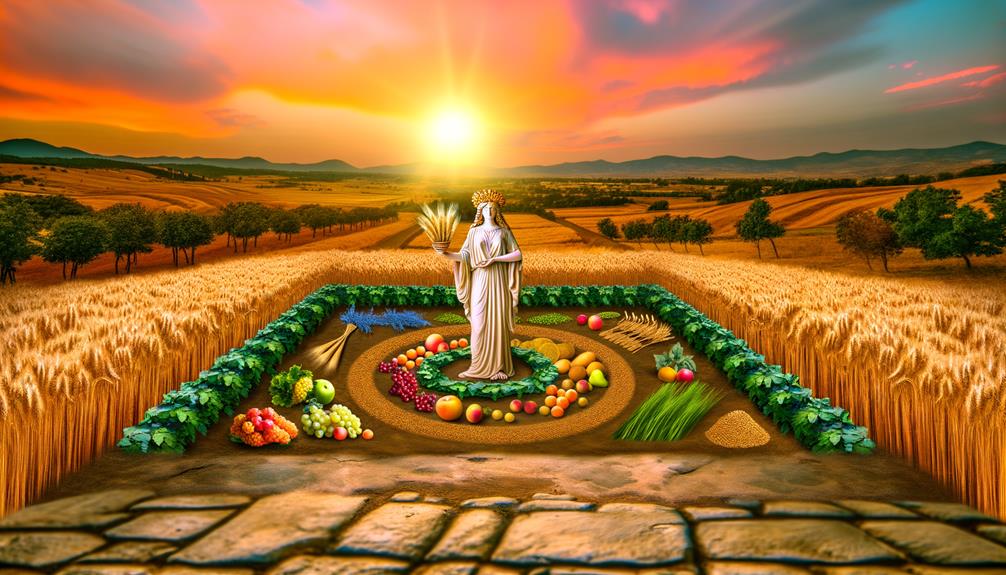Just like a small seed can kick-start a plentiful harvest, so does our journey with Demeter, the Greek goddess of harvest whose story is not as simple as it might first seem. Demeter played a key role in ancient Greek mythology, her influence permeating every corner of daily life in this civilization. She had a hand in their food, their rituals, and even their societal mindset.
But beyond the common tales of her might and goodness, there's another story that often goes unnoticed. It's a story about loss, yearning, and in the end, mending. This plot gives us a more profound insight into not just the goddess herself, but also the ancient civilization that held her in high regard.
Now, we'll dive into the complex layers of Demeter's tale, a story as abundant and varied as the harvest she supervises.
Understanding Demeter's Role

If you want to get a handle on Demeter's significance, you first have to understand that she was the goddess of harvest in the world of ancient Greek Olympian gods. But her influence didn't stop at overseeing agriculture and fertility of the earth. She also had a hand in health, birth, and even marriage. Demeter, Zeus's daughter, wasn't just the goddess of agriculture. She was also the goddess of grain and all growing things.
But her impact wasn't confined to the world of agriculture. It reached into literature, art, and the metaphysical world. Symbolically, you often find her linked to the zodiac constellation Virgo, depicted with a sheaf of wheat, as well as images of the harvest, flowers, fruit, and grain.
Take the story of her daughter Persephone being kidnapped by Hades, the god of the Underworld. This tale explains Demeter's role in the shifting of the seasons. When Persephone gets abducted, Demeter is crushed by sadness, and all growth stops. But when Persephone is allowed to return for a part of the year, Demeter's happiness triggers the rebirth of life and growth.
In the old days in Greece, people worshipped her widely, especially in the Eleusinian Mysteries. This made her a big deal among the gods. Her long-lasting legacy firmly establishes Demeter as a major figure in Greek mythology.
The Connection With Agriculture
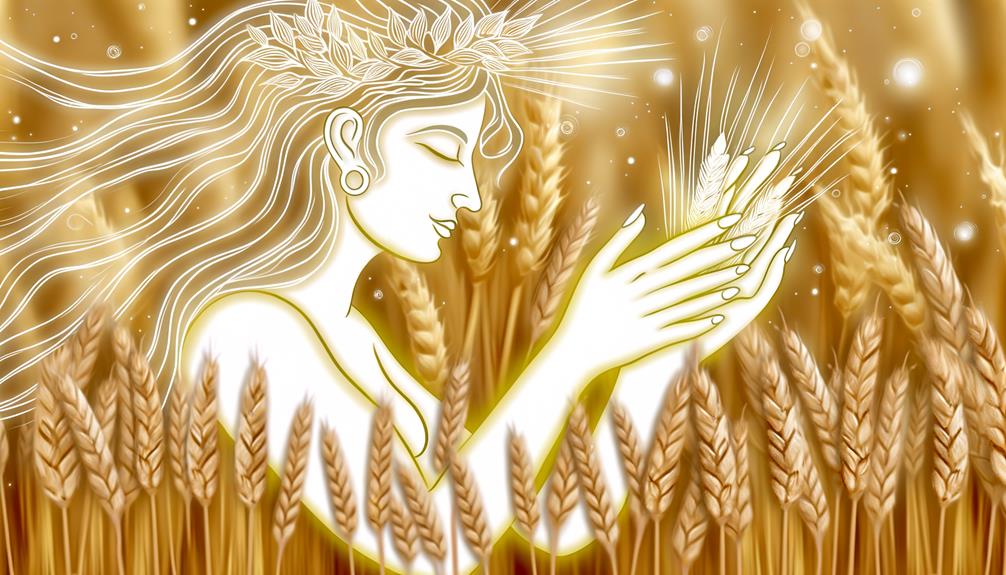
When we delve into the relationship between Demeter and agriculture, we come to realize her astounding impact on crop growth, grain production, food creation, and the overall fruitfulness of the earth. As the deity of grain and earth, honoring Demeter was closely tied to the wealth of the land. Known as the offspring of Cronus, her role in the life cycle was highly respected, symbolizing growth and nourishment in Greek and Roman societies.
The story of Demeter can't be told without mentioning her daughter, Persephone, who embodies the shifting seasons and the pulse of farm life. Their narrative lies at the heart of the Eleusinian Mysteries, age-old ceremonies that honor the annual cycle of life and death, and the perpetual return of growth.
Just take a moment to ponder this:
| Greek and Roman | Earth's Fruitfulness | Health Deity |
|---|---|---|
| Honoring Demeter | Connected to crop wealth | Symbolizes nourishment |
| Demeter and Persephone | Life and seasonal cycle | Growth and rejuvenation |
| Eleusinian Mysteries | Honoring life and death | Stressing on rebirth |
This table clearly outlines how Demeter's position as a harvest deity influences various life aspects, from earth's fruitfulness to health and nourishment, underlining her importance in ancient civilizations.
Demeter's Mythical Lineage
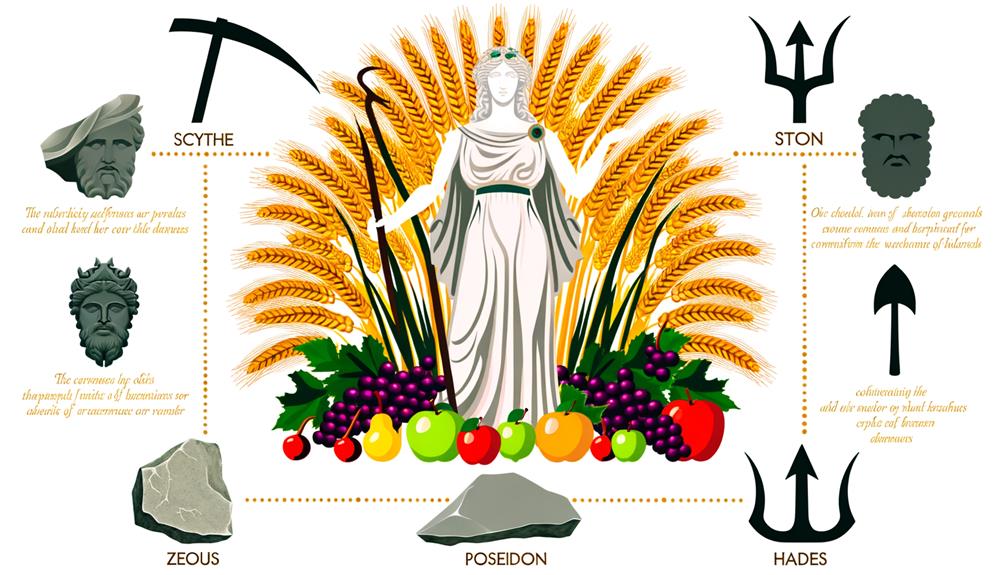
Let's chat about Demeter, a key player in ancient mythology, and her impact on farming and life cycles. But first, we need to look at her backstory to fully grasp her role.
Born to the Titans Cronus and Rhea, Demeter was a big deal in Greek mythology as a mother of the gods. Her siblings were also pretty important – we're talking Hestia, Hera, Hades, Poseidon, and Zeus!
Demeter had a child with Zeus (who also happened to be her brother). This resulted in the birth of their daughter, Persephone. The narrative of Persephone being kidnapped by Hades, who wasn't only another god but also the brother of Demeter and Zeus, is a crucial part of the Demeter story. When Hades chose Persephone to be his Underworld queen, Demeter was heartbroken, leading to a bitter winter settling over the earth.
When Zeus demanded Persephone's return to prevent a disastrous famine, it marked the arrival of spring and the resurgence of life. This repeating event highlights Demeter's role as the goddess in charge of the harvest.
Therefore, the interconnected stories of Demeter and Persephone represent the ongoing cycle of death and rebirth, a key concept in comprehending Greek mythology.
The Tale of Demeter and Persephone
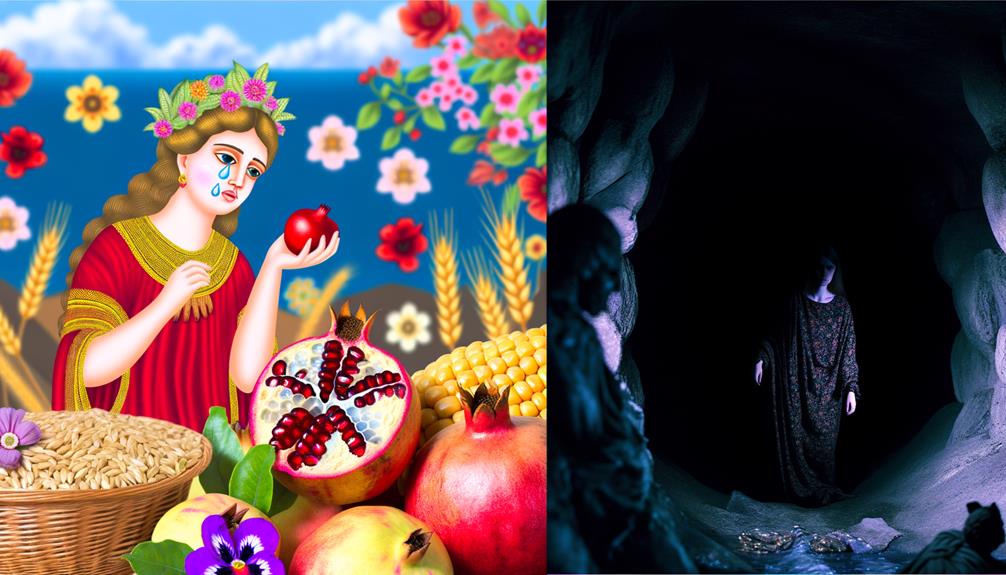
Let's chat about the compelling myth of Demeter and Persephone. This tale is a touching one that highlights the very heart of life, death, and the repeating cycles of nature.
Persephone, Demeter's daughter, is a symbol of purity and fresh beginnings as the goddess of spring. Her story starts when Demeter is on a trip, and Persephone is left alone. Seeing his chance, Hades abducts her with Zeus's approval.
This story is notable for a few reasons:
- Demeter, heartbroken by the loss of her daughter, spends all her time looking for Persephone. In doing so, she neglects her responsibilities as the harvest goddess and brings about a famine.
- Eventually, a compromise is reached: Hades agrees to let Persephone go home to her mother for part of the year, a decision that leads to the creation of the seasons.
- The tale also underscores the power of motherhood. Known as the childbirth goddess, Demeter embodies the unbreakable bond between a mother and her child. As Persephone's mom, she shows us the extremes a mother will go to protect her offspring.
And so, the myth of Demeter and Persephone beautifully mirrors life's natural cycles of birth, death, and rebirth.
Worship and Festivals of Demeter
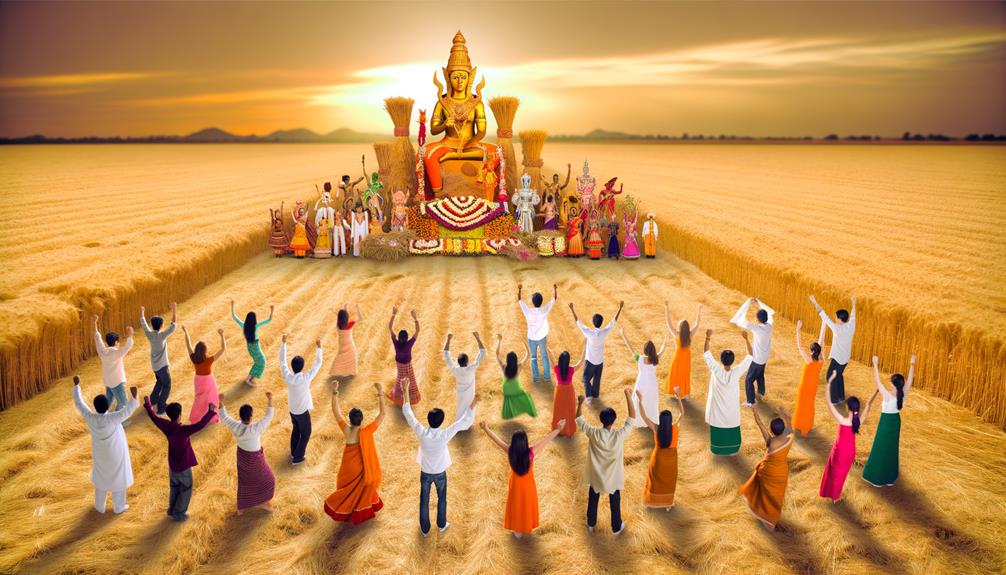
Alright, let's chat about the worship and festivals dedicated to Demeter. This was a major part of her role in ancient society.
Demeter, also known as Ceres, was a goddess with a pretty big role in Greek religion. Her cult was everywhere, with her temples, known as Megara, usually found in groves near towns everywhere from Crete to Sicily.
One of the main events to honour Demeter was the Thesmophoria festival. This was when secret rituals took place, and offerings like pigs, bulls, cows, honey-cakes, and fruits were given to the goddess. The idea was to thank her for the fertility and abundance she brought to the earth.
The worship and festivals of Demeter were more than just a party. They showed just how important she was in ancient Greek culture. These rituals and festivals were full of symbolism and mystery, and they really showed how much the ancient Greeks respected the Goddess Demeter. They remind us of the strong connection between humans and the divine in the universe.
Frequently Asked Questions
How Did Demeter Become a Goddess?
So, you want to know how I ended up being a goddess? Well, it's a story that goes back to the time of the Olympian pantheon. I was in charge of the harvest and the fertility of earth. Now, this wasn't just a role I picked up one day. It was deeply connected to a really intense time in my life when my daughter was kidnapped. This caused a huge famine across the land. It was so bad that Zeus himself had to step in and help get her back.
What Is the Story of the Demeter?
Have you ever wondered about the intriguing tale of Demeter? She's a fascinating figure from Greek mythology, known as the goddess of the harvest. The narrative takes a dramatic turn when her daughter, Persephone, is kidnapped by Hades. The intense sadness Demeter feels at this loss casts the world into winter. Yet, when Persephone is allowed to visit her mother for part of the year, Demeter's happiness triggers the arrival of spring. It's a compelling narrative with themes of love, heartbreak, and the changing seasons.
What Happened in the Story Demeter?
Let's chat about the tale of Demeter. You know, the one where Hades snatches her daughter Persephone? This unfortunate event leads to Demeter neglecting her duties, resulting in the earth losing its fertility. Naturally, this calls for some serious discussion about getting Persephone back. This story mirrors the changing of the seasons. Pretty cool, right?
What Is Demeter Birth Story?
Let me tell you about my birth. I came into existence as the second offspring of Titans Rhea and Cronus. A shocking twist in my story is that my own father swallowed me! But Zeus, in his wisdom, rescued me from that predicament. A key part of my narrative is that I'm Persephone's mother, and this relationship is the reason behind the shifting seasons.
Conclusion
Wrapping up, Demeter, our cherished goddess of the harvest, is more than just a symbol of agriculture and growth. She embodies maternal affection, grief, and rebirth.
The story of her and her daughter, Persephone, deepens our grasp of the cycles of life.
The respect and rituals that surround her worship testify to her enduring impact.
So, as we enjoy the fruits of the earth, let's spare a thought for Demeter, the life-giving power at the heart of our harvest.

